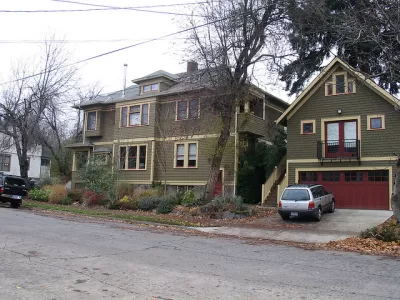Accessory dwelling units, granny flats, mother-in-law units—whatever you call them, they're now legal in Austin.

Jennifer Curington reports that the "Austin City Council agreed to lessen restrictions on accessory dwelling units, or ADUs."
"Changes approved by council allow ADUs to be located 10 feet from each property’s main home instead of 15 feet as currently required by city law," reports Curington. "Also, the minimum lot size required to build an ADU has been reduced from 7,000 square feet to 5,740 square feet, and the structure cannot be larger than 1,100 square feet." The article also provides a lot of detail about the limitations on the use of ADUs.
ADUs are usually a hot button politically when communities consider easy ways to ease land use regulations and add density. The politics of the issue in Austin followed a traditional playbook: "Proponents of the changes said ADUs could be used as a tool to tackle Austin’s affordability crisis, and opponents expressed concern about preserving neighborhood character and allowing code changes that may override some neighborhood plans." In the end, the City Council decided to update the ADU regulations before the city completes the CodeNEXT overhaul of its zoning code.
FULL STORY: Austin City Council lessens restrictions on accessory dwelling units

Planetizen Federal Action Tracker
A weekly monitor of how Trump’s orders and actions are impacting planners and planning in America.

Maui's Vacation Rental Debate Turns Ugly
Verbal attacks, misinformation campaigns and fistfights plague a high-stakes debate to convert thousands of vacation rentals into long-term housing.

Restaurant Patios Were a Pandemic Win — Why Were They so Hard to Keep?
Social distancing requirements and changes in travel patterns prompted cities to pilot new uses for street and sidewalk space. Then it got complicated.

In California Battle of Housing vs. Environment, Housing Just Won
A new state law significantly limits the power of CEQA, an environmental review law that served as a powerful tool for blocking new development.

Boulder Eliminates Parking Minimums Citywide
Officials estimate the cost of building a single underground parking space at up to $100,000.

Orange County, Florida Adopts Largest US “Sprawl Repair” Code
The ‘Orange Code’ seeks to rectify decades of sprawl-inducing, car-oriented development.
Urban Design for Planners 1: Software Tools
This six-course series explores essential urban design concepts using open source software and equips planners with the tools they need to participate fully in the urban design process.
Planning for Universal Design
Learn the tools for implementing Universal Design in planning regulations.
Heyer Gruel & Associates PA
JM Goldson LLC
Custer County Colorado
City of Camden Redevelopment Agency
City of Astoria
Transportation Research & Education Center (TREC) at Portland State University
Jefferson Parish Government
Camden Redevelopment Agency
City of Claremont





























